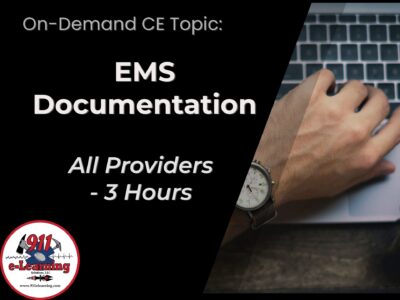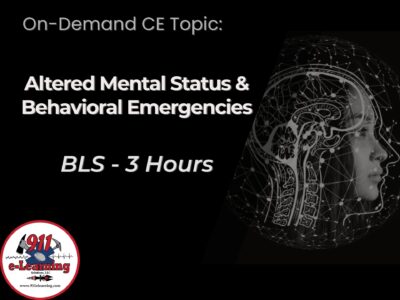Physical fitness is not just important for maintaining a healthy lifestyle. In EMS, it is…

Mental Health Support for EMS Providers: Breaking the Stigma
Home » 911 e-Learning News » Mental Health Support for EMS Providers: Breaking the Stigma
In the high-stress world of Emergency Medical Services, the mental well-being of providers is often overlooked. The demands of the job, which include witnessing traumatic events and dealing with life-or-death situations, can take a significant toll on an individual’s mental health. However, in a profession where strength and resilience are prized, discussing mental health struggles can be challenging. Breaking the stigma surrounding mental health in the EMS community is crucial to ensure that providers receive the support they need to maintain their well-being.
The Importance of Mental Health Awareness in the EMS Community
EMS providers are frequently exposed to situations that would be unimaginable to most people. From severe accidents to critical medical emergencies, these experiences can lead to cumulative stress, burnout, and, in some cases, post-traumatic stress disorder (PTSD). Despite this, many EMS providers feel pressure to keep their emotions hidden, fearing that acknowledging their struggles might be seen as a sign of weakness.
The reality is that mental health issues are common in the EMS profession, and recognizing this is the first step toward breaking the stigma. Promoting mental health awareness within the EMS community helps to normalize the conversation around mental well-being. By acknowledging that mental health is just as important as physical health, EMS organizations can create an environment where providers feel safe to seek help when needed.
Resources and Strategies for EMS Providers to Maintain Mental Well-Being
1. Peer Support Programs
One of the most effective ways to provide mental health support in the EMS community is through peer support programs. These programs involve training EMS providers to offer emotional and practical support to their colleagues. Peer support teams are often composed of individuals who have faced similar challenges, making them uniquely equipped to understand and assist their peers.
Peer support programs foster a culture of openness, allowing providers to share their experiences and feelings without fear of judgment. This can be especially valuable after particularly traumatic incidents, where immediate emotional support can prevent the development of more serious mental health issues.
2. Access to Professional Counseling
While peer support is invaluable, access to professional mental health services is also essential. EMS organizations should ensure that their providers have access to counseling services, either through employee assistance programs (EAPs) or external providers. Counseling can help EMS providers process their experiences, develop coping strategies, and manage stress.
Some organizations also offer critical incident stress debriefings (CISD) following particularly traumatic events. These sessions, led by trained professionals, provide a structured environment for EMS providers to discuss their experiences and emotions, helping to mitigate the impact of trauma.
3. Training and Education on Mental Health
Education plays a key role in breaking the stigma around mental health in EMS. Incorporating mental health training into the standard curriculum for EMS providers can help to raise awareness and equip providers with the tools they need to manage their mental well-being. Training topics might include recognizing the signs of burnout, coping with stress, and understanding the impact of trauma.
Additionally, training should emphasize the importance of self-care and encourage EMS providers to prioritize their mental health. By making mental health education a routine part of EMS training, organizations can help to create a culture where seeking help is seen as a proactive and responsible choice.
4. Promoting a Work-Life Balance
The demanding nature of EMS work often makes it difficult for providers to maintain a healthy work-life balance. Long shifts, unpredictable hours, and the emotional toll of the job can lead to burnout if not properly managed. EMS organizations can support their providers by promoting a balanced approach to work and life.
This might include offering flexible scheduling options, encouraging regular time off, and providing resources for stress management. By fostering a work environment that respects the need for rest and recovery, EMS organizations can help prevent burnout and promote overall mental well-being.
5. Encouraging Open Communication
Creating an environment where open communication about mental health is encouraged is vital. EMS leaders and supervisors should actively promote dialogue about mental health, ensuring that providers know they can speak up without fear of retribution or stigma. This can be achieved through regular check-ins, team meetings focused on mental health, and by leading by example—EMS leaders should be open about their own mental health experiences when appropriate.
Mental health is a critical component of overall well-being for EMS providers. Breaking the stigma around mental health in the EMS community is essential to ensure that providers receive the support they need. By implementing peer support programs, providing access to professional counseling, offering mental health training, promoting work-life balance, and encouraging open communication, EMS organizations can create a culture that prioritizes mental well-being.
At 911 e-Learning Solutions, we are committed to supporting the mental health of EMS providers. We offer a range of resources and training programs designed to help providers maintain their mental well-being while delivering the highest level of care to their patients. Remember, taking care of your mental health is not a sign of weakness—it’s a vital part of being an effective and resilient EMS professional.
Browse Popular On-Demand Courses
-
Psychiatric and Behavioral Emergencies – BLS$30.00
-
Blast Injuries – Ear Injuries$5.00
-
Crush Injuries$5.00
-
2024 Emergency Vehicle Operator$10.00
-
EMS Documentation$15.00
-
Shock & Resuscitation – BLS$10.00
-
Altered Mental Status and Behavioral Emergencies – BLS$15.00
-
Pediatrics Assessment – ALS$10.00
-
Blast Injuries – 4 Part Series$20.00
Related Posts
- Physical Fitness within EMS
- Compassion Fatigue
Compassion fatigue is a common struggle among many professionals within the medical field. Check out…
- Peer Mentoring in EMS
Being a Paramedic Student is hard - very hard. Christine Turner unveils her research in…









